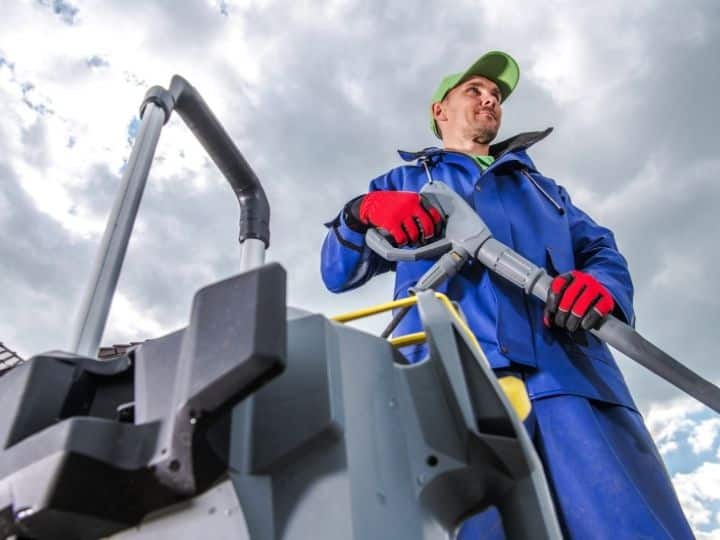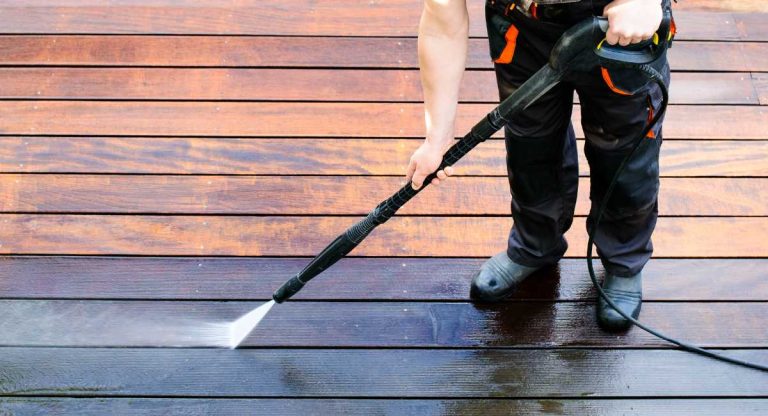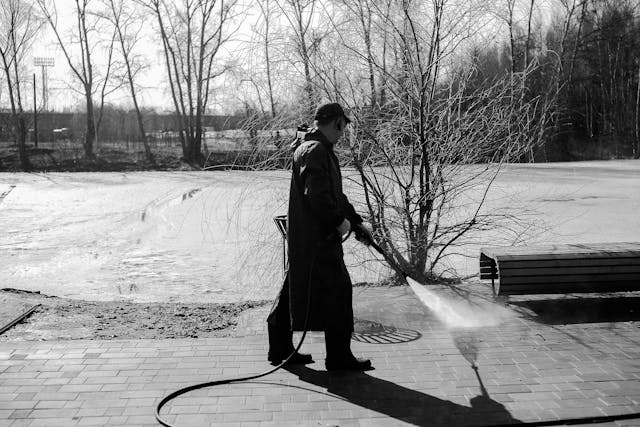
When hiring a power washing service, it’s easy to assume all pressure washers are created equal. But there’s a huge difference between the machine you rent at a big box store and the commercial-grade equipment used by true professionals. 💪🔧
Just like a chef needs the right knives, a professional power washing contractor needs the right tools to deliver safe, effective, and long-lasting results — without damaging your home. 🏡💦
In this article, we’ll walk through the essential equipment every quality power washing company should have in their toolkit — and why it matters to you as a homeowner or business owner. ✅
🧼 1. Commercial-Grade Pressure Washers
Let’s start with the backbone of any power washing service — the pressure washer itself.
What to expect:
- High PSI (pounds per square inch): Usually between 2,500–4,000 PSI for heavy-duty cleaning.
- High GPM (gallons per minute): Typically 3–5 GPM for faster, more effective rinsing.
- Gas-powered motors: These offer more power and mobility than electric units.
- Hot water options: Some units heat water up to 200°F to cut through grease and oil. 🔥
🧠 Why it matters: The higher the PSI and GPM, the better the cleaning power. But more importantly, pros know when not to use too much pressure, especially on delicate surfaces like wood or siding.
🪄 2. Surface Cleaners
You may have seen those circular, spinning attachments used on driveways and patios. Those are called surface cleaners — and they’re a sign you’re working with someone who values efficiency and even results.
Benefits:
- Covers wide, even areas quickly
- Prevents streaking
- Helps avoid over-spraying onto landscaping or siding
- Leaves a consistent clean appearance
🏁 If your contractor doesn’t use one for flat surfaces, they might be cutting corners — or using outdated methods.
🧪 3. Specialty Nozzles and Wands
The spray tip on a power washer controls the angle and intensity of the water stream. Professionals carry a variety of nozzles for different jobs:
- 0° tip (red): Laser-focused stream for tough stains — rarely used.
- 15° tip (yellow): Aggressive cleaning on hard surfaces.
- 25° tip (green): General-purpose nozzle for decks, siding, and driveways.
- 40° tip (white): Gentle rinse for delicate surfaces.
- Black tip: Low pressure — used to apply soap or detergent.
- Turbo nozzles: Spin rapidly for fast stain removal on concrete.
✨ Look for contractors who switch nozzles based on surface — it shows experience and care.
Browse Amazon Here For Commercial Pressure Washers And Accessories
🧴 4. Soft Washing Equipment
Not everything should be blasted with high pressure. That’s where soft washing comes in.
Tools used:
- Low-pressure pumps
- Dedicated mixing tanks
- Chemical injectors
- Extended hoses for roof and second-story access
- Eco-friendly detergents and algaecides
Soft washing is the gold standard for:
- Roofs
- Vinyl siding
- Stucco
- Painted wood
🌿 It’s gentler on surfaces and uses cleaning solutions to break down grime instead of pressure.
🧤 5. Safety Gear and Ladders
Professional-grade results require professional safety standards, too.
Expect your contractor to bring:
- Fall protection gear (for roof work)
- Non-slip boots
- Protective eyewear and gloves
- Extension ladders or lifts
- Stabilizers or standoff bars (to prevent ladder damage to gutters)
🛡️ You want to see a crew that respects both their own safety and your home’s integrity.
🚚 6. Water Reclamation Systems (Optional, but Impressive)
Some high-end or eco-conscious companies use water recovery systems to capture runoff — especially for commercial jobs or in areas with environmental regulations.
💧 These systems:
- Suck up dirty water
- Filter out contaminants
- Allow water to be properly disposed of or reused
Not every job requires it, but if your home is near a storm drain, lake, or garden, this is a big plus. 🌎♻️
🧯 7. Chemical Cleaners and Detergents
The right equipment is important — but so are the cleaning agents.
Look for companies that use:
- Biodegradable detergents
- Algae and mildew removers
- Rust and stain removers
- Degreasers (for garages and commercial properties)
- Wood brighteners (for decks)
A real pro knows which chemicals are safe for which surfaces — and how to neutralize them properly. 🚫☣️
🛠️ 8. Extra Tools That Show Professionalism
Here are a few bonus items that suggest a detail-oriented company:
- Tarping materials to protect landscaping
- Painter’s tape to cover outlets and delicate trim
- Extension wands for high reaches without ladders
- Moisture meters for wood prep before sealing
- Before-and-after photo tools for documentation
📷 These tools demonstrate both skill and a commitment to doing the job right.
💬 Questions to Ask About Equipment
Before hiring, ask:
- “Do you use commercial-grade pressure washers?”
- “How do you clean roofs or siding?”
- “What kind of nozzles and attachments do you use?”
- “Do you offer soft washing?”
- “What safety precautions do you follow on-site?”
If they can’t confidently answer these, you may want to keep looking.
✅ Final Thoughts
Power washing is about more than just spraying water. The right tools, attachments, cleaning agents, and safety gear make a huge difference in the quality and safety of the job. 🧼🔧
When hiring a company, don’t be afraid to ask about their gear — because a pro with pro tools gets pro results. Anything less is a shortcut you might regret. 🚫
Browse Amazon Here For Commercial Pressure Washers And Accessories






